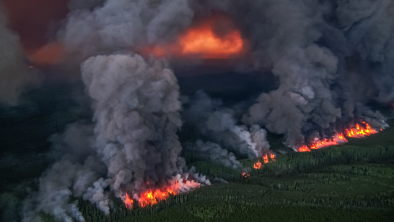VIEW: Area-based tenures are not the answer for BC forests
The Tyee
By Torrance Coste
May 23, 2014
Another spring, another attempt to hand over logging rights to private interests in B.C.
The B.C. government is reviving its push to convert Crown forest lands from volume-based (usually known as Timber Supply Areas, or TSAs) to area-based tenures (Tree Farm Licences or TFLs). Area-based tenures give more control to the tenure holder, and less to the Ministry of Forests, essentially creating a system that resembles private management on public land.
Last year, the minister of forests attempted to rush a bill containing these changes through the legislature before anyone noticed. The Wilderness Committee, along with a host of other environmental groups, First Nations, unions, and forestry experts across the province, raised the alarm, and the public outcry forced the government to shelve the legislation.
This time, the ministry is at least conducting a brief public comment period. But make no mistake, these are the same dangerous changes the government was forced to back away from last year.
The track record of logging companies in B.C. is appalling. Sustainable forest practices, community consultation, recognition of indigenous rights and title, and environmental protection have all fallen by the wayside when they've been given more control.
Handing these corporations exclusive rights would make it more difficult for us to transition to better forest alternatives -- the kind we desperately need in B.C. now and into the future.
When it comes to forest management, our top priorities should include:
- Ensuring First Nations have access to the forest resources they've relied on since time immemorial;
- Conserving the remaining patches of old-growth to preserve endangered species, protect drinking water sources, and sequester carbon;
- Banning raw log exports and prioritizing local jobs and in-province production.
- Converting volume-based tenures to area-based tenures will make all of this more difficult to achieve.
The arguments in favour of creating more TFLs are astoundingly weak, and fall apart after a quick look at the government's own data. The Ministry of Forests states that more TFLs will encourage more community and small-scale forestry, but in reality, over 80 per cent of the existing TFLs are controlled by just five giant logging corporations. The ministry argues that these changes will improve timber supply to mills in forestry-dependent communities, but in coastal B.C., where TFLs are most common, mill closures and raw log exports are both exponentially higher than in other regions, despite the absence of the mountain pine beetle.
Take a drive into a TFL on Vancouver Island, and you'll find clearcuts as bad as anywhere else -- massive fields of stumps where winter rains wash nutrient-rich soil downhill and out to sea. On a trip to one south-Island TFL last year, I found a fresh old-growth clearcut full of two-metre-wide stumps of 900-year-old red cedars.
The government is billing these changes as its response to the timber supply crisis in B.C.'s forest industry, but converting TSAs to TFLs is like throwing gasoline on a fire. The timber shortage was created by over-logging and the general short-sightedness of the industry over decades, not by the lack of control over forest resources by multi-national corporations.
Compounding these problems is years of cuts to the B.C. forest service, which has created huge gaps in the government's understanding of forest ecology and sustainable resource stewardship. This has been well documented in reports by the Forest Practices Board, the B.C. auditor general, environmental groups, and others.
More deregulation is simply not the answer.
There are better alternatives available: other jurisdictions in Canada blow B.C. out of the water in terms of jobs per volume of timber harvested, and economic development models such as Tribal Parks that don't rely solely on timber are appearing and gaining traction. We need to focus on value-added products and maximizing local jobs, while setting aside more forests to sequester carbon, purify drinking water, allow access for First Nations use, and provide critical habitat for endangered wildlife.
Instead, the provincial government is suggesting that we leap further into the industrial status quo that got us into this mess in the first place.
I presented to the ministry's review process earlier this week, and shared these arguments against area-based forest tenures. The public has until May 30 to submit comments on these proposed changes, and it's important that we raise our voices together and demand they drop these plans, yet again.
It's high time for our government to scrap this idea once and for all, and commit to a smarter, more sustainable direction for B.C.'s forests.
Photo: Clearcut logging in a TFL on Vancouver Island (Torrance Coste).


